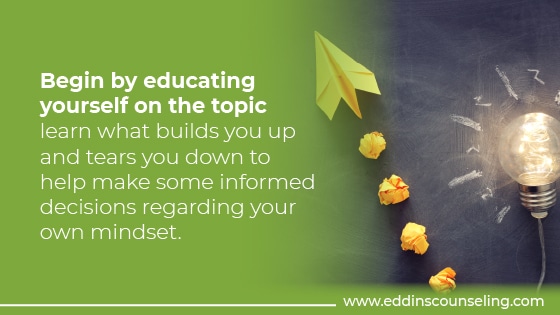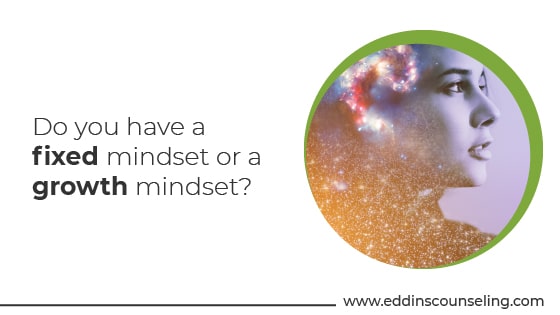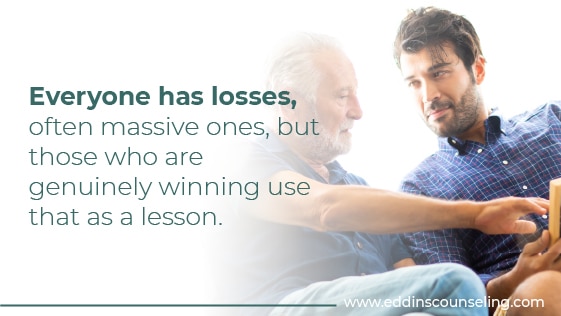January 10, 2022
Why a Growth Mindset is EVERYTHING
Written by Sara Lane
Posted in Self Help / Personal Development and with tags: Goals, cognitive-behavior therapy, mindset, self-talk
You should regularly check in with your mindset.
No matter what time of the year it is or what phase of life you are in, you should regularly check in with your mindset.
There’s been a lot of talk about mindset in recent years. Of course, it’s no wonder, given the ways we’ve all been challenged and changed by current social, political, and personal transitions, not to mention the fallout of a global pandemic.
Our beliefs about ourselves have been challenged, tested in ways that have forced us to look at who we think we are and how we feel. You may have done more thinking about the way you think than you ever have before.
And you’re not alone.
When life presents obstacles to overcome, we may feel pushed around by our circumstances, and the way we perceive ourselves starts to drive our thoughts, reactions, and choices. Research shows that mindset significantly affects a person’s life outcomes, some call it the psychology of success.
Why?
When a new car model becomes an important subject in your life, you suddenly see it everywhere. It’s the same with how you see yourself.
If you look in the mirror or go about your day and all you see is how useless, incompetent, and unworthy you are, life will tend to abide and show you that.
Thus, managing your mindset when life gets hard (or simply different) can make all the difference in how you feel, approach relationships, and achieve your dreams. It affects everything.
Let’s talk about how to make it work for you and your life.
Table of Contents:
- Managing Your Mindset
- Why Mindset is SO Important
- What Type is Yours Today?
- Overcome the Mindset that’s Limiting You
- How to Overcome Your Mindset
- When Life Gets Hard – Believing in Yourself
- 10 Strategies to Push Through
- Support Your Growth Mindset
“Managing” Your Mindset
What and how you think about something routinely shapes your world and reality. Thus, managing your mindset is a powerful skill. When you manage something or someone, you take a leadership role.
You train, guide, oversee, and take responsibility.
Managing your mindset requires the same level of intention and attention.
So, where do you start? Begin by educating yourself on the topic learn what builds you up and tears you down to help make some informed decisions regarding your own mindset.
Why It’s Important
Like we said, your beliefs are absolutely vital. They shape where you set your sights and affect whether you achieve your goal.
Thus, positively and affirming your mental attitude is critical for promoting healthy self-esteem. Pay attention to your self-talk.
Notice how it augments your deepest beliefs, interpretations, and feelings about yourself. Being a mindful guard against thoughts that lean heavily on self-criticism and negativity is key for managing your mindset meaningfully and productively.
To successfully move forward as your best self, you must feel capable of doing so. Mindset is a significant factor in mental agility, emotional flexibility, and personal resilience, too.
Managing your mindset means recognizing how you think. Ask yourself:
- What makes me feel successful?
- What drives my response to adversity?
- How are my effort and outlook shaped by my beliefs?
- How good am I at “hanging in there” or being brave?
- What do I say to myself when I fail, slip up, or experience disappointment?
It’s important to recognize that managing or changing yourself involves awareness and acceptance first. Don’t beat yourself up if you find your mindset might be more obstacle than inspiration right now.
What is your mindset type today?
Depending on your answers to the questions above, managing your mindset may make you aware that you lean more heavily toward one of two mindset camps: a fixed mindset or growth mindset.
- A fixed mindset rests on the belief that your talents and intelligence are fixed— that they are what they are—and unchangeable, for better or for worse. It tells you to stop learning.
- A growth mindset rests on the belief that your intelligence and abilities can be developed and expanded over time.
Both mindsets are usually fostered early in life. Clearly, the latter serves forward-movement and reliance better.
Growth-minded people enjoy life and success because they embrace learning, failure, and “becoming” someone beyond their initial set of gifts and skills. They don’t see themselves as relegated only to who they are right now. Another way to put it is that they don’t have their mind set.
A fixed mindset tends to stay a big fish in a small pond where growth is stunted, and discontent is common. They’re prone to keep proving themselves repeatedly to feel relevant and capable. They don’t feel they have the space to look foolish or uncertain.
To become more growth-minded means moving away from rewarding sheer effort. It’s essential to focus on more than just being good at what you do best.
Focusing on results and “being” only what you are right now often dismisses learning and the joy of growing into someone more. Fortunately, to manage a fixed mindset, a plan for awareness, knowledge, and support can effectively turn things around.
Essentially, to manage your mindset, you must be willing to learn and stretch yourself. Accept that uncertainty and failure is a worthy process. That’s how you discover something new about yourself, fall, bounce back, and develop new perspectives.
The Mindset that’s Limiting you
It’s likely that something your fixed mindset created is “limiting thoughts.” For example, lately, you have started to feel a bit anxious about what you’ve accomplished.
It might feel like other people have “all the luck” or lived charmed lives. While you, well, you know what you do well, and you’ve just gotten used to making the best of what you got.
No growth, no stretching.
This is all you are and all you will ever have.
Okay, let’s stop right there. Thoughts like that are fueling a limiting mindset that can keep you stuck.
Limiting beliefs have a sneaky way of restricting the adventure and the potential of your life and relationships. Unaddressed, they make the world seem small and can keep you convinced that your corner of the world is your only option.
To be fair, many limiting beliefs probably originated early in your life.
It sounds just like that fixed mindset.
Along the way, you interpreted both painful and pleasurable experiences. You ascribed emotional responses to people, situations, and events as support for your beliefs.
These beliefs’ influence on you feels true and baked in, unchangeable. Thus, your perspective feels like the only reality.
But that’s not true at all. You can choose to change your mind, but it takes some effort.
So, what does it take to foster new beliefs? How can you move you out of your comfort zone and into a life you haven’t allowed yourself to imagine?
Let’s work that through together with some of the strategies below:
Overcome the Mindset That’s Limiting You
It feels like there is no hope for you, but we promise there is.
Consider that limiting beliefs generally manifest in three basic ways:
- Shame-based beliefs about who you are. You believe that you can’t do what you want because something is intrinsically wrong with you.
- Suspicion-based beliefs about the world. You believe that that you can’t do what you want because people are holding you back.
- Safety-based beliefs about life. You believe that you can’t do what you want because life is too scary, hard, or stressful.
Think about which of these types of limiting beliefs affect you most. Which is disabling your growth mindset more?
Rework your self-worth.
For years, you may have operated under the assumption that your path and potential were fixed. Believing in yourself doesn’t make much sense when you feel like you don’t have the capacity, approval, or agency to go for what you want.
As you open your mind to growth, build your self-perception, too. You can do this by being proactive and mindful. Otherwise, old, unhelpful habits will creep back in.
- Try journaling, meditation, or other ways to reflect and seek inspiration. Give yourself the time and space to find peace and direction. You aren’t alone in feeling this way; find others who speak on this. Journal these feelings and the effect they have on you. Don’t hold them inside.
- Set and prioritize your relationship boundaries. Look closely at your relationships. Surround yourself with supporters, the mindsets people have around you will affect you. Find those who will encourage you to use your voice and separate yourself from those who hold you back with doubt and negativity.
- Change your inner conversation. How you talk about yourself, your talents, and your weaknesses matter. Be self-loving and encouraging whether you succeed or fail. It may not make the situation better, but you really don’t deserve that beratement.
Recognize that the more aware you are, the better decisions you can make.
Becoming more aware of the thoughts and emotions tied to your beliefs is key. Start paying attention to the story and self-talk that repeat in your mind when you’re on the verge of change or operating outside your comfort zone.
It’s helpful to slow down and consider your reactions when
- you try something new and “unlike you.”
- you make a mistake.
- you conflict with others.
- you are criticized.
- you feel stressed.
What kinds of thoughts do you have at times like these? How do you feel? Tracking your thoughts can help you see what thoughts are automatic and how they are or aren’t serving you.
Give yourself permission to ask questions and be wrong.
Now is the time to get curious. Question your beliefs and seriously consider that there are other ways of looking at life. Use your imagination!
If your assumptions about yourself aren’t true, what could your life look like?
Are your beliefs acting as a shield against failure? Give yourself time to really think about what it might take to try a new path, fail, and again.
Don’t rush through this. Start exploring options in your head and choose alternatives to beliefs that get in your way. Working with a therapist can be very helpful here.
Believing in Yourself & Pushing Through When Things are Hard
There are times when life seems like it’s one hard thing after another, and when things get hard, people try to help. They say “just believe in yourself” or ” just put your head down and get through it.”
They’re not wrong. Overcoming often involves just pushing through, looking for the sunshine.
However, figuring out how to do that isn’t quite so easy, particularly if you struggle with change or trying new things.
To persevere and thrive during tough times, it’s important to lean into growth instead of digging deeper into your comfort zone. As Zig Ziglar once said, “If you are not willing to learn, no one can help you. If you are determined to learn, no one can stop you.”
Powerful words that ring true all these years after he wrote them.
10 Strategies for Pushing Through and Developing Your Mindset
Please note that this is not us telling you to bottle it up and push through every hard thing that happens to you. Find support, mindset requires it.
Don’t give yourself an ulcer if you feel extreme stress and duress as you face the challenges ahead.
These tools are for when you are resistant to change and feel stressed, but they don’t apply across the board. Know your limits because they do exist. Please remember that and take care of yourself.
1. Believe that Nothing is Fixed but Your Thinking
Life changes on a dime. If you can accept that you are helped, not hurt, by growing through it, you may feel much better about pushing through difficult times.
Staying fixed instead of moving forward mentally is exhausting and usually fruitless. The palm tree bends with the wind when a hurricane comes, but the mighty, unmoveable oak tree gets snapped.
Learning and changing willingly can soothe anxiety, boost your confidence, and make you feel a lot better about basically everything.
2. Forget Flawlessness
In a world where everything is staged, it is hard to swallow, but it’s important.
Acknowledge, accept and embrace that your imperfections exist. Even if there are people who are very good at hiding them, every human on this planet has flaws.
They are there and are probably exhausted by how much work it takes to cover them up. Don’t waste your valuable time hiding your perceived weaknesses.
Use them to your advantage or overcome them as necessary. Permit yourself to let them show so that you can put your mental energy to better use.
3. Fail Well
Failure feels less catastrophic when you start to see life’s challenges as possibilities and opportunities. Everyone has losses, often massive ones, but those who are genuinely winning use that as a lesson.
Believing in yourself is less tied to doing it all perfectly and results from going all-in, win or lose. Your defeats teach you something important about what you’re capable of.
Often, if you ask those people how they got to where they are, they will say it was through failing.
4. Set Aside Approval Seeking & People Pleasing
Are you overly concerned with the approval of others? It might not be everyone’s opinion that you are worried about, but there is always someone in your mind, right?
If you forfeit learning and moving forward for the sake of others’ endorsements, you might miss the chance to test yourself meaningfully.
No matter how well-intended an opinion is, it is still just an opinion. The only person’s approval you should chase is your own.
When developing a growth mindset, you might learn to limit the number of other people’s feelings that you let in.
5. Put the Process First
When you’re low and struggling, it’s easy to focus on escaping discomfort. Choose instead to focus on the process of persevering.
Use the struggle to make yourself aware and intentional. Ask yourself questions like “what’s changed throughout this period?”, “how am I better or worse than before?” or “what thoughts keep coming to mind?”
Every challenging moment is an opportunity to learn, and an excellent example of this is Youtubers. They can go a long time and see very little success, which means they have to focus on the process and enjoy what they are doing. Try to do the same.
6. Prioritize a Big Picture Perspective
Learning helps shape a deeper understanding of yourself and the world. As you push through hard times with learning in mind, you may find that a more profound sense of purpose evolves. Be sure to back up and get a bird’s eye view of your circumstances when you start to feel bogged down by your difficulties. Perspective matters.
You could try going to a place with a nice view of your area to help make this feel more true.
7. Growth with a Group (Who Matches Your Mindset)
Growth with others is a surefire way to build your self-esteem and connect meaningfully. Share the road with others who are pushing through with a growth mindset, too. Your tribe is out there, no matter who you are or what you feel.
Progressing with other people teaches lessons that can reveal a myriad of strengths and opportunities that you might lose out on if you’re overly worried about hiding your insecurities or imperfections.
Also, it’s okay if you thought that your current group was it, but it doesn’t seem to be that way anymore. Sometimes people are meant to cross your path but not merge with it.
Offer your group a place within your vision, and if they don’t want it, you don’t need to try and hold them there.
8. Relax, Be Realistic, and Reflect on Your Growth
Give yourself a break. There’s no one-size-fits-all model for growth or need for competition. Learning takes time, and it looks different for you than others.
This is a poisonous mindset, especially in an age where it feels like we are competing with millions of people across the world. If you tend to fall into this way of thinking, perhaps take a break from social media or platforms where you find yourself comparing too much.
You are the only one like you on this planet, and your journey can only belong to you. Pay attention to and reflect daily on what you’ve learned. Honor your time and effort and the unique way you’re pushing through.
9. Just Say, “Yet.”
Remind yourself that you don’t have to settle for the way things are, no matter where you are in your life. Leave your fixed mindset behind because you can learn more and change your life as long as you believe in growing forward.
Tell yourself daily that you are not stuck or incapable. You simply haven’t reached your goal yet.
10. Attitude is Everything
Your growth mindset is something to be proud of. Allow your willingness to learn and change to boost your mood and create a sense of joy. Remember that you get to take responsibility for your own attitude.
You really are doing a great job. Even if you don’t feel like you can label yourself as someone with a growth mindset, you getting this far says otherwise.
Manage Your Growth Mindset with Support
Don’t worry if you have made it to this point, and it still feels impossible. You aren’t alone in what you feel.
You might feel alone, defeated, or unsupported, unable to find people with a growth mindset. And all of this might seem a bit scary, but that’s okay. The freedom and self-discovery gained are worth the shift.
If you’re ready to start making life changes and embracing a growth mindset, please contact one of our Houston counselors for help. You can view all our services online.
To get started with an Eddins Counseling Group therapist in Houston, Montrose, or Sugar Land, call (832) 559-2622 or text (832) 699-5001 us today!
Together we can create a plan for you to reach your goals.
Why You Feel This Way
Get instant access to your free ebook.
Grounding & Self Soothing
Get instant access to your free ebook.
7 Mood-Boosting Tips
Get instant access to your free ebook.




























